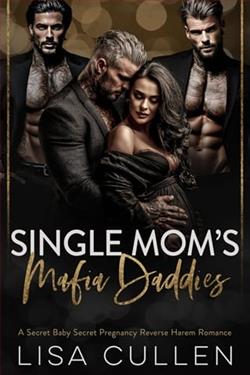Page 106 of Aftermarket Afterlife
“I was unsure about you when you first came to the city,” she said. “All of us were. Oh, we know you Prices say that you’re not Covenant anymore, and you’ve been doing a decent amount to prove that over the past few decades, but what’s a few decades against centuries? Your names are in our histories, and we don’t speak of you kindly. Then you show up with a current Covenant member and expect us to trust you? It’s a miracle no one stabbed you.”
“It’s a miracle no onetried,” I sniffled, unable to let the comment pass.
Candice ignored me. “And then you find our sweet William, and you didn’t tell anyone about him, you didn’t rush to claim the greatest kill any Covenant member could possibly make. If your family was in exile against your will, taking his heart would have washed you clear of your sins in their eyes, but instead, you gave him back to us. Yousavedus, in a way I’m not sure you can fully appreciate as a member of a species that still has a functional gene pool. My mother spent her whole life dreaming of a husband, and the only thing I regret is that she died before we found him.”
I wiped my cheeks again. “We had to give him back to you, and give you back to him. You’re right—my family used to be part of the Covenant. Some members still are. We helped put the dragons on the verge of extinction. There was no way I could pass up an opportunity to pull you back.”
“We didn’t need a savior.”
“I know. But maybe I needed a save.”
Candice smiled thinly as she nodded, patting my arm. “You did good. And so did he. And yes, I know he’s gone, but we don’t mourn the way you mammals do. We haven’t had that luxury in a long, long time.”
Sometimes the reminders of what my ancestors did to hers could just sneak up on me, even when we were talking in circles around them. I winced. “Thank you for coming to get me.”
“Like I said, William told me to,” she said, waving off my gratitude with a flip of her hand. “Come on. We need to get out of the open.”
It was hard to see any interpretation of our current position where the descriptor “open” would apply; we probably weren’t as far beneath the city as it felt, but then, I’m essentially arboreal—hence the mice using it as my title. I’m not claustrophobic or anything, but I’m not super comfortable any time I can’t see the sky. There was nothing remotely open about our current position. One earthquake and we’d be buried under so many tons of rubble that our bodies would never be retrieved.
But Candice turned away to hurry down the tunnel, and I followed her without objection. I didn’t really have another choice. The hospital had been all too happy to see the back of me; they weren’t going to welcome me back without a serious injury, and even then, they might be happier if I just didn’t show. If I went back to the bogeyman community that had agreed to shelter us after the Nest was destroyed, I’d have to face the well-meaning sympathies of all the people who loved me...and worse, I’d have to tell the mice what had happened. Oh, God, the mice.
My family cohabitates with one of the last known colonies of Aeslin mice, a species of highly intelligent cryptid rodents who balance that intelligence with a hyper-religiosity that drives them to seek the divine in their daily lives. Generations ago, they found that divinity in us, and have worshipped us to this day. They believed Dominic was one of their gods. A whole branch of their church was dedicated to his worship. Theylovedhim. This was going to break their little pseudo-rodent hearts, and I just couldn’t deal with that yet. My own grief was too hot and raw to allow me to make space for theirs.
It had been a long time since we’d actually lost a family member. I’d neveractuallyseen the Aeslin grieve before, and I wasn’t sure I really wanted to. Not that I was going to have a choice. They had as much right to their grief as I did.
I stumbled, a wave of what felt like physical despair sweeping through me, rendering my knees weak and threatening to send me crashing to the ground. Candice paused again, looking back at me.
“Don’t collapse now,” she said, voice more sour than supportive. “We’re almost there.”
Gritting my teeth, I forced myself to keep on walking. The tunnel began to brighten around us, small motion-activated safety lights coming on in the niches near the top of the walls. They glowed with a clean, pale LED white, enough to see by, not enough to totally scramble our night vision, and I was grateful for them, even as I wondered at the security.
“We have motion-activated darks that we turn on when we’re not expecting visitors,” said Candice.
I nodded. Darks were developed by human witches in answer to the needs of the bogeymen and other dark-adapted intelligences; they did exactly what the name would imply, and when a dark came on, it de-luminated an area as well as a light would illuminate it. If they balanced lights with darks, they were managing their security better than I had momentarily feared.
And I was focusing on the lighting because it was better than focusing on anything else. I was going to be in mourning for a long time. I didn’t need to start it now, while we were in the middle of certain danger.
Candice motioned for me to follow as she adjusted her trajectory and walked toward a small service door set into the wall and nestled back in a deep alcove, where it was almost invisible unless viewed from the precise right angle. She approached the door, knocked twice, paused, then knocked three times more. The door cracked open, just far enough for someone to peer through and see her, then slammed shut again. Candice, unperturbed, took a step back and folded her arms, waiting.
There was a series of clicks as the locks were undone, and the door swung all the way open, revealing a slice of the cavern beyond. Candice stepped through, then turned to look at me.
“Well?” she asked. “You coming?”
I followed her.
• • •
The dragons of Manhattan had an aboveground Nest in the Meatpacking District for years, only to largely abandon it when they moved underground, then start using it again, this time as a preschool of sorts, when their birth rates spiked and they began seeing male children for the first time in centuries. That Nest was gone now, burned to the ground by the Covenant of St. George. The dragons would probably sell the land from here, since rebuilding would have been virtually impossible. Too much attention; too many prying eyes.
Fortunately for them, they still had their subterranean home. A natural cavern cut deep into the bedrock below the city, it had been there before Europeans came to North America, and long before the settlement that would be known as Manhattan. William had been very young when his sisters carried him with them on a boat to the “New World,” sneaking him into the caves under cover of darkness and staying by his side as the city grew around and over them, inevitably sealing him off from the world outside. That was always the fate of male dragons, whose sheer size made it difficult for them to move around much once they reached adulthood. They could fly when they were very young, and hunt when they were reaching maturity, but by the time they were fully grown, they were better equipped to moving slowly through their hoards, counting their gold and courting their wives.
Everything we had indicated that, under normal circumstances, there was one male dragon born for every five to ten females, and one adult male survived for every twenty females. So far, that had been borne out in the births among the Nest since William’s return; girls outnumbered the boys five to one, and they doted on their little brothers without question or compromise. They seemed to have a genetic predisposition to adore the boys, viewing them as protectors and something to take care of at the very same time.
It was an interesting adaptation, one that would encourage the comparatively defenseless females to cluster around the males, who were enormous and intimidating and could breathe fire, thus providing those same males with food when they needed it. The whole species benefitted, as long as a bunch of human monster-hunters didn’t come along and throw everything all out of whack.
I have no idea what dragon culture looked like before humanity hit them. Humans are minimally sexually dimorphic, to the point where normal variance and the right jacket can make gender anybody’s guess. We’d be miserable if we had to live that way. And dragons would be miserable if someone could mysteriously make them live like humans.
The cavern Candice and I had entered was William’s original landing place in Manhattan, the underground home his sisters had chosen for him when they were trying to hide the last known male dragon. He didn’t know much of his own life story, or what had happened to his sisters after he went to sleep: he knew that their father had been killed, and most of his brothers, in a violent Covenant offensive, but that one of his sisters had been entrenched in a local village as a weaver’s assistant, and she’d been able to smuggle the youngest and smallest of the boys to safety wrapped in a bundle of textiles. From there, they had decided to flee Europe, a little family group of women and children crossing an ocean to try and keep the future of their species safe.















